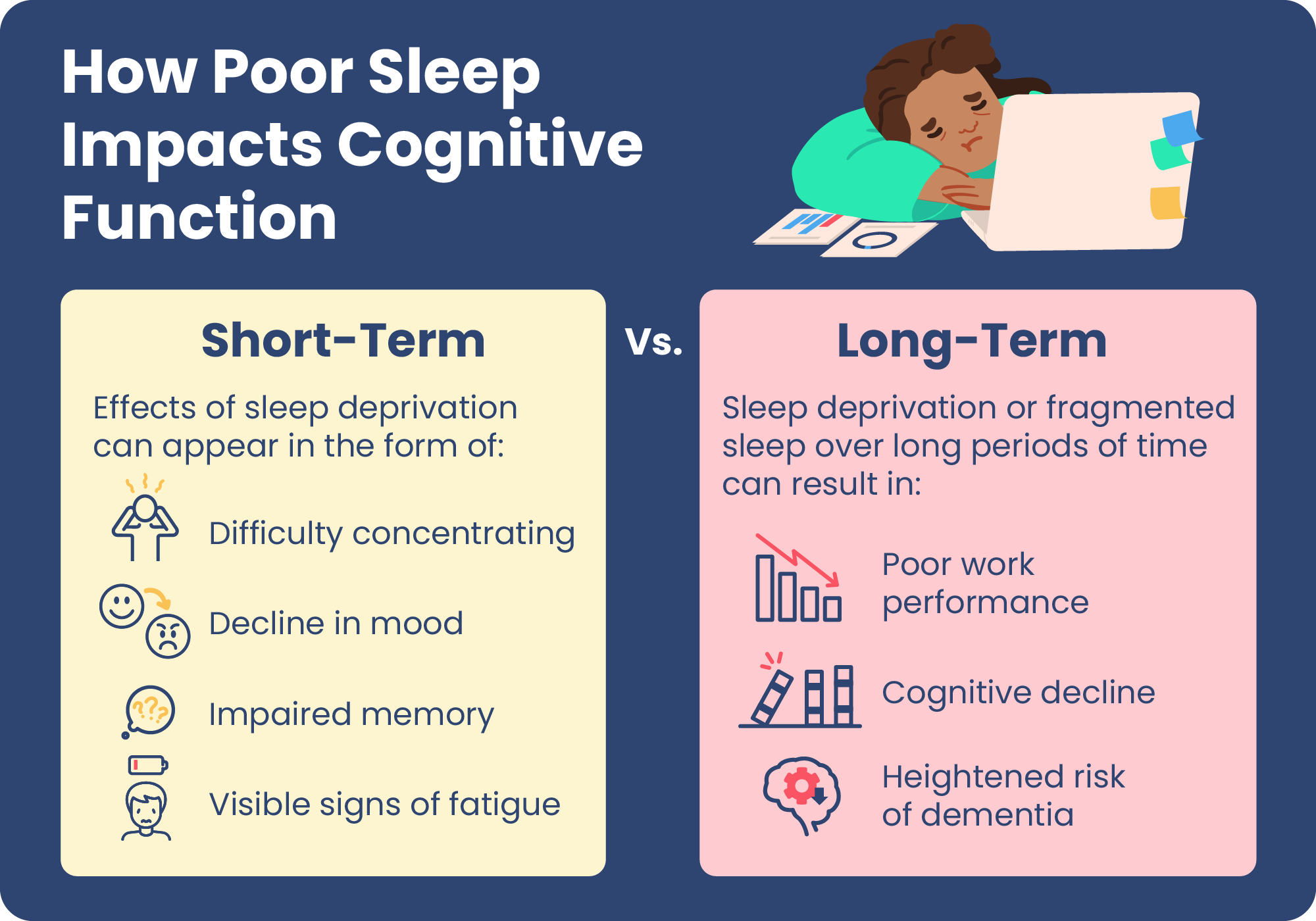How Lack of Sleep Impacts Cognitive Performance and Focus
Getting enough hours of high-quality sleep fosters attention and concentration, which are prerequisites for most learning. Sleep also supports numerous other aspects of cognition, including memory, problem-solving, creativity, emotional processing, and judgment. Levels of brain activity fluctuate during each stage of sleep — including both rapid eye movement (REM) and non-REM (NREM) sleep — and evidence increasingly suggests that sleep enhances most types of cognitive function.
For people with sleep deprivation, insomnia, sleep apnea, or other conditions that prevent them from getting adequate rest, short-term daytime cognitive impairment is common. Improving sleep quality can boost cognitive performance, promote sharper thinking, and may reduce the likelihood of age-related cognitive decline.
How Poor Sleep Affects the Brain
During a typical night of sleep, an individual cycles through the three stages of NREM sleep, followed by a period of REM sleep every 90 to 120 minutes, several times per night. Both the brain and body experience distinct changes during these cycles that correspond to individual stages of sleep. During each part of this process, different chemicals in the brain become activated or deactivated to coordinate rest and recovery.
Poor sleep can take many forms, including short sleep duration or fragmented sleep. Without adequate sleep, the brain struggles to function properly. Because they do not have time to recuperate, neurons in the brain become overworked and less capable of optimal performance in various types of thinking.
The short-term detriments of poor sleep on the brain and cognition can be the result of pulling an occasional all-nighter, while those with chronic sleep problems may see a continuous negative effect on day-to-day tasks. Over the long-term, poor sleep may put someone at a higher risk of cognitive decline and dementia.
What Are the Short-Term Cognitive Impacts of Poor Sleep?
Poor sleep can harm intellectual performance, academic achievement, creative pursuits, and productivity at work. The cognitive impacts of poor sleep can also create safety risks, including drowsy driving. Motor skills, keeping rhythm, and even some types of speech can decline without proper sleep. The potential short-term impacts of poor sleep are wide-ranging:
- Excessive Sleepiness: Drowsiness and fatigue are common daytime effects of a night of poor sleep. In response to excessive fatigue, a person may inadvertently nod off for a few seconds, which is known as a microsleep.
- Poor Attention Span: Poor sleep reduces a person’s attention, as well as their learning and processing. A lack of sleep has also been found to induce effects that are similar to being drunk , which slows down thinking and reaction time. Poor sleep also diminishes placekeeping , which includes the ability to carry out instructions.
- Reduced Adaptability: Some studies have found lack of sleep to hinder cognitive flexibility, reducing the ability to adapt and thrive in uncertain or changing circumstances. A major reason this occurs is rigid thinking and “feedback blunting” , in which the capacity to learn and improve on-the-fly is diminished.
- Reduced Emotional Capacity: Poor sleep can also alter how emotional information is understood . When learning something new, analyzing a problem, or making a decision, recognizing the emotional context is often important. However, insufficient sleep impedes the ability to properly process the emotional component of information.
- Impaired Judgment: In some cases, this dysregulated emotional response impairs judgment. People who do not get sufficient sleep are more likely to make risky choices and may focus on a potential reward rather than downsides. It can be difficult to learn from these mistakes, since the normal method of processing and consolidating emotional memory is compromised due to lack of sleep.
What Are the Long-Term Cognitive Impacts of Poor Sleep?
Insufficient sleep and sleep fragmentation are frequently associated with cognitive decline and dementia. Furthermore, in people already diagnosed with dementia, poor sleep has been linked to a worse disease prognosis. Some cognitive effects of poor sleep can be felt immediately, but mounting evidence shows that sleep influences your long-term risk of cognition issues:
- Impaired Memory: Both NREM and REM sleep appear to be important for broader memory consolidation , which helps reinforce information in the brain so that it can be recalled when needed. NREM sleep has been linked with declarative memory, which includes things like basic facts or statistics, and REM sleep is believed to boost procedural memory such as remembering a sequence of steps. Poor sleep impairs memory consolidation by disrupting the normal process that draws on both NREM and REM sleep for building and retaining memories. Studies have even found that people who are sleep deprived are at risk of forming false memories .
- Alzheimer’s Disease: Research shows that sleep helps the brain conduct important housekeeping, such as clearing out potentially dangerous beta amyloid proteins. In Alzheimer’s disease, beta amyloid forms in clusters, called plaques, that worsen cognitive function. Studies have found that even one night of sleep deprivation can increase the amount of beta amyloid in the brain . One analysis found a considerably higher risk of Alzheimer’s disease in people with sleep problems, estimating as many as 15% of cases of Alzheimer’s disease were attributable to poor sleep.
How Does Poor Sleep Affect Creativity and Other Cognitive Processes?
Creativity is another aspect of cognition that is hindered by sleeping problems. Connecting loosely associated ideas is a hallmark of creativity, and this ability is strengthened by good sleep. NREM sleep provides an opportunity for information to be restructured and reorganized in the brain, while new ideas and links between thoughts often emerge during REM sleep. These processes enable insight, a core element of innovation and creative problem-solving.
Limited or restless sleep can also indirectly affect cognition. For example, migraine sufferers are more likely to have morning headache attacks when they do not get enough sleep, and lack of sleep can increase the risk of infections like the common cold. Sleep deprivation may worsen symptoms of mental health conditions like anxiety and depression. These and numerous other physical and mental health issues are shaped by sleep quality, and may affect a person’s attention and concentration.
Are the Cognitive Impacts of Poor Sleep the Same For Everyone?
Not everyone is affected by poor sleep in the same way. Studies have found that some individuals may be more susceptible to cognitive impairment from sleep deprivation, and this may be influenced by genetics.
Research has discovered that adults are better at overcoming the effects of sleep deprivation than younger people. Teens are considered to be at a heightened risk for detrimental effects of poor sleep on thinking, decision-making, and academic performance because of the ongoing brain development that occurs during teen years.
Some studies have also found that women are more adept at coping with the effects of sleep deprivation than men, although it is not yet clear if this is related to biological factors, social and cultural influences, or a combination of both.
Can Sleep Disorders Affect Cognition?
Sleep disorders, like insomnia, frequently involve insufficient or fragmented sleep, so it comes as little surprise that they can be linked to cognitive impairment.
Obstructive sleep apnea (OSA) is among the most common sleep disorders. It occurs when the airway gets blocked, which then leads to lapses in breathing during sleep and reduced oxygen in the blood. OSA has been associated with daytime sleepiness as well as notable cognitive problems related to attention, thinking, memory, and communication. Studies have also found that people with sleep apnea have a higher risk of developing dementia.

Does Too Much Sleep Affect Cognition?
Many studies examining the effects of sleep on thinking have found that an excess of sleep can also be problematic for brain health. In many cases, research has discovered that both too little and too much sleep are associated with cognitive decline.
The explanation for this association remains unclear. It is not known if excess sleep is caused by a coexisting health condition that may also predispose someone to cognitive problems. Overall, these research findings are an important reminder to get the right amount of sleep each night.
Will Improving Sleep Quality Benefit Cognition?
For people with sleeping problems, improving sleep quality offers a practical way to enhance cognitive performance. Getting the recommended amount of uninterrupted sleep can help the brain recuperate and avoid many of the negative consequences of poor sleep on diverse aspects of thinking.
Researchers and public health experts increasingly view good sleep as a potential form of prevention against dementia and Alzheimer’s disease . Although more studies are needed to conclusively determine sleep’s role in preventing cognitive decline, early research suggests that taking steps to improve sleep may reduce the longer-term likelihood of developing Alzheimer’s disease.
Tips To Improve Sleep and Cognitive Performance
Anyone who feels that they are experiencing cognitive impairment or excessive daytime sleepiness should first speak with their doctor. A physician can help identify or rule out any other conditions, including sleep disorders, that may be causing these symptoms. They can also discuss strategies to get better sleep.
Many approaches to improving sleep start with healthy sleep hygiene. By optimizing your bedroom environment and everyday habits and routines, you can eliminate many common barriers to sleep. Setting a regular bedtime and sleep schedule, avoiding alcohol and caffeine in the evening, and minimizing electronics in the bedroom are a few examples of sleep hygiene tips that can make it easier to rest well each night.
References
14 Sources
-
Dawson, D., & Reid, K. (1997). Fatigue, alcohol and performance impairment. Nature, 388(6639), 235.
https://www.nature.com/articles/40775 -
Stepan, M. E., Altmann, E. M., & Fenn, K. M. (2020). Effects of total sleep deprivation on procedural placekeeping: More than just lapses of attention. Journal of experimental psychology. General, 149(4), 800–806.
http://doi.apa.org/getdoi.cfm?doi=10.1037/xge0000717 -
Whitney, P., Hinson, J. M., Jackson, M. L., & Van Dongen, H. P. (2015). Feedback Blunting: Total Sleep Deprivation Impairs Decision Making that Requires Updating Based on Feedback. Sleep, 38(5), 745–754.
https://academic.oup.com/sleep/article/38/5/745/2416953 -
Killgore, W. D. (2010). Effects of sleep deprivation on cognition. Progress in Brain Research, 185, 105–129.
https://pubmed.ncbi.nlm.nih.gov/21075236/ -
Van Someren, E. J., Cirelli, C., Dijk, D. J., Van Cauter, E., Schwartz, S., & Chee, M. W. (2015). Disrupted sleep: From molecules to cognition. The Journal of Neuroscience, 35(41), 13889–13895.
https://pubmed.ncbi.nlm.nih.gov/26468189/ -
Maquet P. (2000). Sleep on it!. Nature neuroscience, 3(12), 1235–1236.
https://pubmed.ncbi.nlm.nih.gov/11100139/ -
Lo, J. C., Chong, P. L., Ganesan, S., Leong, R. L., & Chee, M. W. (2016). Sleep deprivation increases formation of false memory. Journal of sleep research, 25(6), 673–682.
https://pubmed.ncbi.nlm.nih.gov/27381857/ -
Shokri-Kojori, E., Wang, G. J., Wiers, C. E., Demiral, S. B., Guo, M., Kim, S. W., Lindgren, E., Ramirez, V., Zehra, A., Freeman, C., Miller, G., Manza, P., Srivastava, T., De Santi, S., Tomasi, D., Benveniste, H., & Volkow, N. D. (2018). β-Amyloid accumulation in the human brain after one night of sleep deprivation. Proceedings of the National Academy of Sciences of the United States of America, 115(17), 4483–4488.
https://pubmed.ncbi.nlm.nih.gov/29632177/ -
Bubu, O. M., Brannick, M., Mortimer, J., Umasabor-Bubu, O., Sebastião, Y. V., Wen, Y., Schwartz, S., Borenstein, A. R., Wu, Y., Morgan, D., & Anderson, W. M. (2017). Sleep, Cognitive impairment, and Alzheimer’s disease: A Systematic Review and Meta-Analysis. Sleep, 40(1), 10.1093/sleep/zsw032.
https://pubmed.ncbi.nlm.nih.gov/28364458/ -
Yordanova, J., Kolev, V., Wagner, U., & Verleger, R. (2010). Differential associations of early- and late-night sleep with functional brain states promoting insight to abstract task regularity. PloS one, 5(2), e9442.
https://pubmed.ncbi.nlm.nih.gov/20195475/ -
Lin, Y. K., Lin, G. Y., Lee, J. T., Lee, M. S., Tsai, C. K., Hsu, Y. W., Lin, Y. Z., Tsai, Y. C., & Yang, F. C. (2016). Associations Between Sleep Quality and Migraine Frequency: A Cross-Sectional Case-Control Study. Medicine, 95(17), e3554.
https://pubmed.ncbi.nlm.nih.gov/27124064/ -
Prather, A. A., Janicki-Deverts, D., Hall, M. H., & Cohen, S. (2015). Behaviorally Assessed Sleep and Susceptibility to the Common Cold. Sleep, 38(9), 1353–1359.
https://pubmed.ncbi.nlm.nih.gov/26118561/ -
Ma, Y., Liang, L., Zheng, F., Shi, L., Zhong, B., & Xie, W. (2020). Association Between Sleep Duration and Cognitive Decline. JAMA network open, 3(9), e2013573.
https://pubmed.ncbi.nlm.nih.gov/32955572/ -
Spira, A. P., Chen-Edinboro, L. P., Wu, M. N., & Yaffe, K. (2014). Impact of sleep on the risk of cognitive decline and dementia. Current Opinion in Psychiatry, 27(6):478-83.
https://pubmed.ncbi.nlm.nih.gov/25188896/











